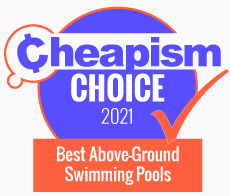To determine our top picks for best above-ground pool, we leaned heavily on pool reviews from owners posted on the websites of retailers such as Walmart, Target, Home Depot, Amazon, and elsewhere. Cheap pools don’t attract a great deal of commentary from consumer product experts, but we did find credible feedback on sites like Best Reviews. We also consulted Steve Goodale, a well-regarded technical specialist and educator in the swimming pool and spa industry. The founder of the website Swimming Pool Steve, he provided a wealth of information regarding price, materials, and maintenance that any prospective pool owner will find helpful. In this buying guide, you’ll find excerpts from our interview with Goodale, along with answers to frequently asked questions and tips on what you need to know before buying an above-ground pool.
Types of Above-Ground Pools: What type of above-ground pool is best?
Your choice of pool will depend largely on how much money, time, and effort you’re willing to invest in the purchase, installation, and upkeep — and whether you want to keep the pool around for just one summer or more.
Above-ground pools can cost less than $100 or more than $10,000. A variety of factors go into explaining that price difference, but essentially it comes down to the manufacturing materials. According to Goodale, price is a pretty good indicator of quality and longevity. “The expected service life from an above-ground pool will vary dramatically based on the quality of the pool kit and the quality of the installation,” the pool pro said. “Some of the cheapest above-ground pool kits are really only suitable to last a season or two at the most, where on the other end of the spectrum, you can easily have a high-quality above-ground pool last for multiple decades.”
Inflatable pools are the least expensive type of above-ground pool and, of course, have the shortest lifespans. These pools are the easiest to set up, however, and can work with most any surface — just make sure the ground is generally level and devoid of rocks, twigs, and branches. A majority are on the small side and are often thought of as kiddie pools, although inflatables up to 18 feet in diameter are available. While they run the gamut of shapes, round and rectangular are the most common varieties. The cheapest are made of simple vinyl and are filled with air throughout, while “ring pools,” named for the inflatable ring at the top that rises as water is poured in, frequently boast PVC-coated walls. Some are even equipped with features like built-in filters to keep the water clean. As suggested, durability is the main drawback with these types of pools, however, and reviews indicate that anything more than one summer of use is a bonus, although with a ring pool you may get a slighter longer lifespan than with the typical inflatable pool.
Soft-side pools or metal-frame pools consist of a heavy-duty vinyl or PVC pool liner, which serves as the floor and walls, that’s suspended on a frame, usually made of steel. They can be set up and taken down without special tools or required skills and frequently come with filter pumps and other accessories like ladders and covers. Frame pools are medium-term investments; the best last for a few seasons (with proper care). Less expensive pools of this type tend to carry fairly limited warranties — 90 days is common — but better quality frame pools with higher price tags, like the Intex Ultra XTR series we recommend (which comes in both rectangular and round models), offer coverage for up to two years. We even saw owner reports of these Intex pools lasting eight years or more. Better steel frame pools can be left up year-round, especially in milder climates, while budget models should be taken down and stored away between seasons.
Hard-sided pools, made of steel, aluminum, or resin, are the sturdiest of above-ground pools, and also the most expensive, although prices range widely. According to our expert Steve Goodale, whereas lower-end models may be “hastily manufactured,” consumers can expect that with more expensive hard-sided pools “materials like the wall panels will be thicker and more durable, and the fasteners and hardware will be higher-quality metals with better machining.” These types of pools can be winterized and are intended for permanent (or semi-permanent) installation. For setup, they require that the ground be leveled and all grass and sod dug out, and sand may need to be imported, as well. There must be an electrical source close by. Despite a fairly involved set of requirements, however, depending on the purchaser’s skill level and access to willing helpers, they can often be a DIY project. If professional installation is required, expect to add a few hundred dollars, potentially even thousands, to the cost. And several reviews warn that trained installers may balk at setting up pools bought online.
What are the best swimming pool brands?
Brands like Intex, Bestway, Summer Waves, and Blue Wave are among the most common names in store-bought backyard swimming pools. Intex is by far the biggest fish on the cheaper end of the market and the largest manufacturer of soft-side models. The brand dominates every list of best above-ground pools. Slightly higher-end Blue Wave makes saunas, spas, and many accessories in addition to pools and is more of a crossover brand, likely to be found in professional pool suppliers’ stocks as well as at retailers like Walmart and Home Depot or for sale on Amazon. Consumers’ overall ratings for the brands discussed here cluster in the 3- to 4-star range, although Intex gets the nod more consistently from a significantly greater number of reviews.
For homeowners set on a hard-sided pool and willing to pay a bit more, brands like Cornelius and Embassy (owned by Doughboy, a well-regarded manufacturer known for its pricey steel and resin models) are well-recommended and still relatively affordable. But you’ll have to be willing to shop around with independent dealers; sites like Amazon and other general retailers have only a very small assortment available for order. (Note: For delivery, hard-sided pools are packed on a pallet and come by truck, which must be met by the buyer. The driver will not bring the pallet to the door, let alone to the backyard. Shipping costs can also be quite hefty.)
 Keeping young children entertained is easy with a plastic or inflatable kiddie pool. But if you want the whole family to stay cool during the hot summer months, you’ll need a backyard pool. An in-ground pool is one option, but be prepared to dig deep into your wallet (they run about $30,000 or more) and consider the many potential drawbacks of a backyard pool. Above-ground pools are far less expensive and many are easy to assemble. We identified several cheap pools that should offer at least a couple of seasons, if not several years, of warm-weather family fun. Even better, you don’t need to go to a specialty retailer; you can find many decent above-ground pools at Walmart, Target, or Amazon. Our full buying guide includes expert tips on what to consider when buying a backyard pool, regardless of retailer or price.
Keeping young children entertained is easy with a plastic or inflatable kiddie pool. But if you want the whole family to stay cool during the hot summer months, you’ll need a backyard pool. An in-ground pool is one option, but be prepared to dig deep into your wallet (they run about $30,000 or more) and consider the many potential drawbacks of a backyard pool. Above-ground pools are far less expensive and many are easy to assemble. We identified several cheap pools that should offer at least a couple of seasons, if not several years, of warm-weather family fun. Even better, you don’t need to go to a specialty retailer; you can find many decent above-ground pools at Walmart, Target, or Amazon. Our full buying guide includes expert tips on what to consider when buying a backyard pool, regardless of retailer or price.


 While a majority of reviewers suggest this pool should stand the test of time, there is some grumbling here and there about pools that arrived damaged or soon developed leaks. Still, with a best-in-class two-year warranty on the frame, liner, and filter pump, there’s more than enough to recommend taking the plunge with an Intex Ultra XTR.
While a majority of reviewers suggest this pool should stand the test of time, there is some grumbling here and there about pools that arrived damaged or soon developed leaks. Still, with a best-in-class two-year warranty on the frame, liner, and filter pump, there’s more than enough to recommend taking the plunge with an Intex Ultra XTR.















